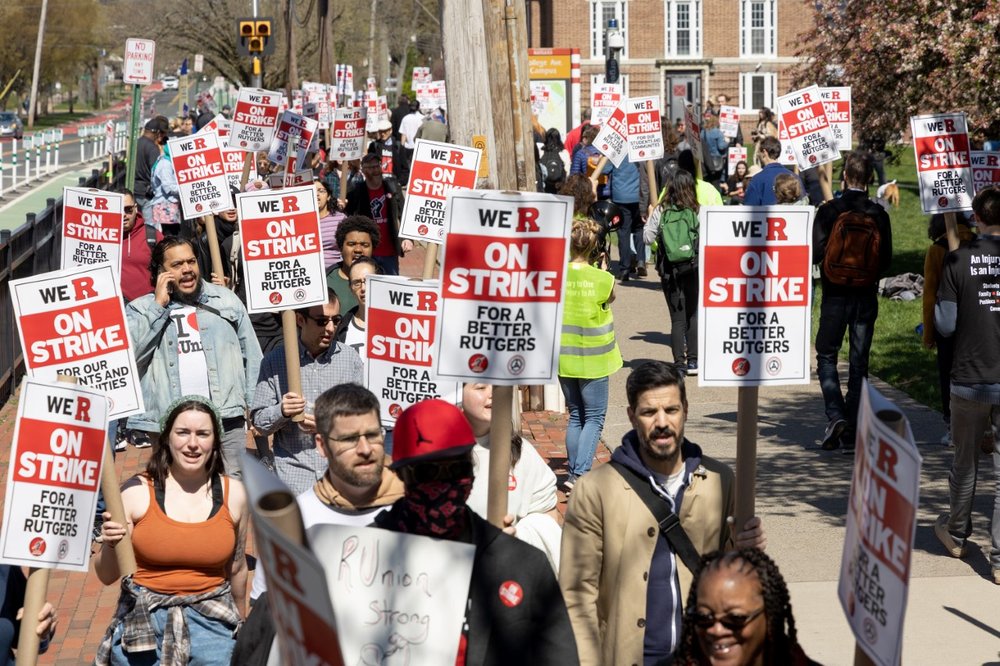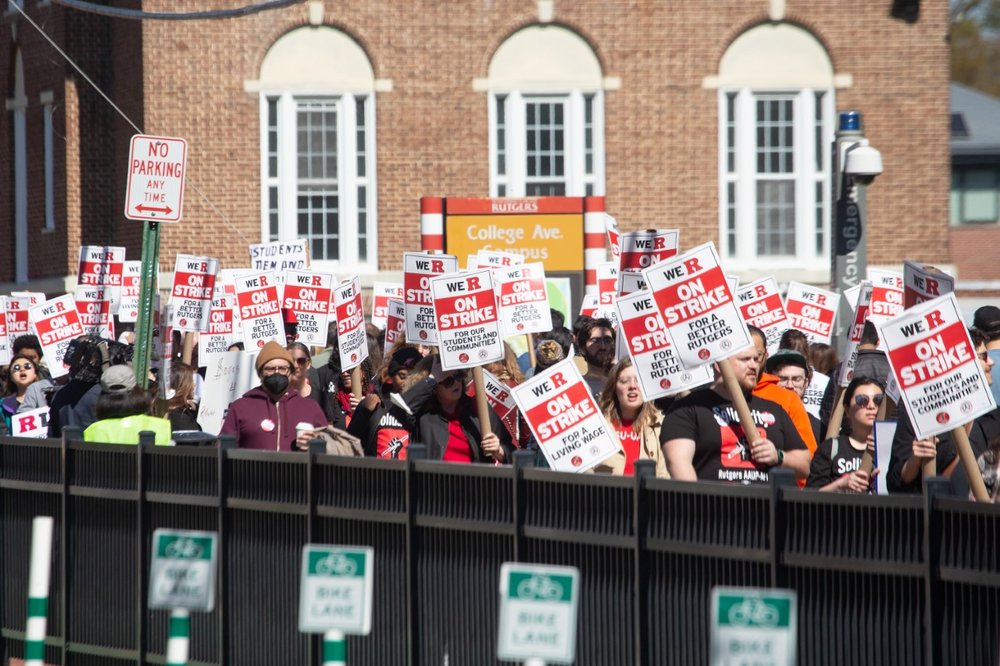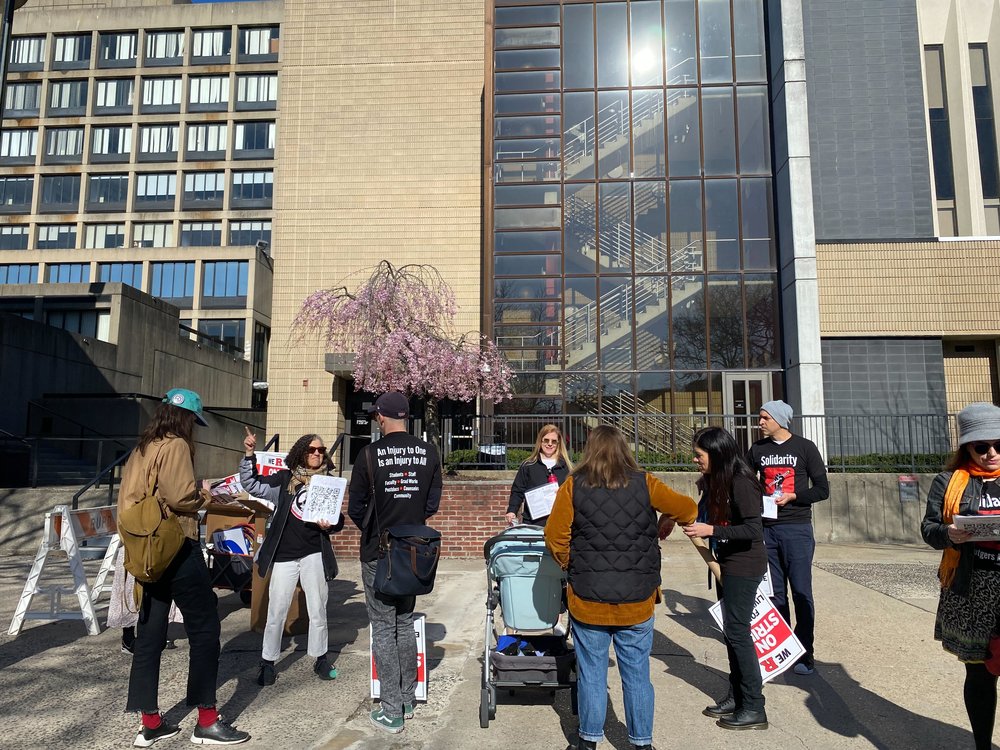Rutgers strike: Students find empty classrooms as professors picket for end to 'exploitation'
April 10, 2023, 1:46 p.m.
Union negotiations and Rutgers administrators were summoned to Gov. Phil Murphy's office Monday to continue talks

Rutgers students walked into empty classrooms Monday morning as their professors demonstrated outside in what is the first teaching strike in the university's history.
Picket lines were set up across Rutgers’ three campuses in New Brunswick, Newark and Camden as hundreds of professors, adjunct faculty members and graduate workers — joined by alumni and undergraduate students — held signs demanding better wages.
Three faculty unions representing 9,000 members announced their plan to strike Sunday night after nearly a year of contract negotiations with university officials. The unions — which are demanding job security for part-time lecturers and better pay for graduate workers who earn $30,000 a year – asked members to cancel classes and stop grading. It’s not clear how many of Rutgers’ 67,000 students were affected.
Adjunct faculty members — who must reapply for their jobs every semester, regardless of how long they’ve taught on campus — are paid per credit. That rate was set to reach a base pay of $5,799 per three-credit course at the end of the last contract, with some lecturers earning up to $7,234 per course. A part-time lecturer teaching seven three-credit courses at the rates under the last contract would make between about $40,600 and $50,600.
That puts adjuncts' rates, proportionately, considerably below that of their full-time peers. According to the National Center for Education Statistics, the average professor at Rutgers made about $161,000 in 2021. The average assistant professor made about $84,000 and the average associate professor made $106,000. Faculty members classified as lecturers made an average of $65,000 and instructors made $61,000.
Gov. Phil Murphy convened a meeting at noon Monday between university administrators and union representatives in the hopes of reaching a fair deal. As of early evening, those talks were continuing.

‘We R on Strike’
During a rally Monday afternoon on the New Brunswick campus, students and labor activists joined picketing professors dressed in union shirts and holding signs that read “We R on Strike.” Some students said all their classes were canceled and others said most were, but that they weren’t crossing the picket lines in support of their teachers.
“It is only by mobilizing our power from the bottom up, which is this right here today, that we are going to change this problem. All we have to do is stay together, stay unified, and let's get the contract we all deserve,” Amy Higer, president of the Rutgers Adjunct Faculty Union, told the crowd.
At the Rutgers-Newark campus earlier in the day, some classrooms sat empty as confused students wondered why classes were canceled.
“I'm all for these teachers. I hope they get paid,” freshman Richard Cuevas said. He was heading to the gym for the day after realizing his English class was empty and his professor was picketing.
Others joined the protests, and said more than half of their classes had been canceled for the day.
“I should be teaching a class in this building right here and I canceled my class,” said Estelle Epstein, a part-time lecturer in physics who was picketing at the Rutgers-Newark campus. “And I have another one that'll start in another hour or so that will also be canceled, and another one online this afternoon that will also be canceled.”
Epstein and other faculty skipped classes under a threat of legal action from the Rutgers administration, which says prior court cases have established public worker strikes are illegal as a matter of common law. No New Jersey statute, however, makes public worker strikes illegal, and union heads have told their members they won’t face legal consequences unless the university both convinces a court to order an end to the strike, then subsequently finds striking faculty in contempt.
The university said said in an FAQ on its website that anyone taking part in a labor disruption could be “subject to a loss of pay and/or benefits, and other sanctions as they may apply or as the court deems appropriate.” But late Monday, a Rutgers spokesperson said administrators agreed to hold off on going to the courts so long as progress was being made in talks.
Epstein said it was strange not to be teaching, but that adjuncts like her needed to be paid fairly.
“Adjuncts are paid per credit: a lab course that needs two, three or four hours per week is paid as if it's the same as something that meets for one hour, and it's ridiculous,” Epstein said. She said she teaches at three universities to make ends meet, and was scheduled to teach a course at another institution Monday afternoon.
Starting at 9 a.m., demonstrators at the Rutgers-Newark campus chanted, “Exploitation ain't the way, adjuncts deserve equal pay” — a nod to the demands the faculty unions have made in negotiations that remain unresolved even after the most recent contracts expired in June.
In New Brunswick, teachers and students gathered at three picketing sites, including along busy College Avenue where Rutgers bus drivers, fire trucks and cars honked in support and students joined the protests. Other students sat along the grass or break-danced nearby as crowds chanted, “Equal work for equal pay” and “Our school.”
Vee Khan, a biology student, said she, too, was demonstrating in solidarity with her teachers.
“More than half of my classes are taught by adjuncts and part-time professors and TAs [teaching assistants]," Khan said. "And it seems insane that they're not being paid the same amount that my actual professors are, and that wages are lower for them just because they're part-time when they're teaching most if not all of my classes.”
Picketers expected to be out every day until 5 p.m, with the unions giving their members updates via Zoom and YouTube every night at 8 p.m. A rally was set Monday for 1 p.m. at Voorhees Mall on the College Avenue Campus in New Brunswick.
“Our [university] president sent out an email saying he's disappointed [in the strike]," Elin Diamond, a full-time professor in the English department, said. "We're disappointed. We are disappointed. We want to be in the classroom.”
Diamond said she was joining the picket line in solidarity with adjunct faculty and graduate workers.
“They're not being paid a living wage, and they have a lot of burdens, including our faculty burdens, hosted on their shoulders," she said. "I don't understand why the administration doesn't understand this, why they don't say, 'This is an important cause. Let's put Rutgers on the map as the university who can do this.'”
MIT's Living Wage calculator considers $18.71 per hour a living wage for a single adult worker in New Jersey with no children. That equates to just under $39,000 in a 40-hour workweek.

Remaining uncertainty
The university said in its FAQ it expected some classes to continue, but union representatives said Monday they didn’t know how many faculty members had canceled classes.
Among the three striking unions, 94% of members who participated in a strike authorization vote gave their leaders authority to call the work stoppage. That could suggest few will cross picket lines.
Rutgers also said in its FAQ it’s continuing to plan commencement ceremonies — with graduation just over a month away — and that “every effort will be made to ensure that the strike does not affect our students’ progress toward graduation.” It didn’t say what specific provisions might be made for students to continue that or other academic progress, if classes aren’t held for weeks or longer.
University officials have said they’ve been bargaining in good faith, and intend to continue doing so.
While university President Jonathan Holloway said in a message Sunday night he believes the two sides were close to a resolution, union leaders said they remain far apart on core demands.
Mary Rizzo, a tenured history and American studies professor at Rutgers-Newark, said she joined the picket lines because many graduate students, part-time lecturers and adjunct faculty members don’t enjoy the same protections she does.
“And I know adjuncts or [part-time lecturers] who are trying to make due, cobbling together a salary working at three different institutions, including Rutgers,” she said.
Steven Coco, 28, a Jersey City resident and public school teacher, said he came to support picketers because faculty members of all kinds — including part-time faculty – were invaluable to his own experience as a Rutgers undergrad and grad student
They helped students to “basically learn how to become an adult in the United States and New Jersey,” he said.
Assembly Speaker Craig J. Coughlin said in a statement Monday he was “disappointed Rutgers has not concluded an agreement with its unions.”
"At a world class educational institution such as Rutgers, professors, teaching faculty and all staff must be treated fairly and with respect to ensure students are provided the best possible educational opportunity,” he said.
The New Jersey Education Association also said it stands in solidarity with the Rutgers unions. The last public workers strike in New Jersey took place in 2018 with the NJEA’s support, when 4,000 Jersey City public school teachers walked off the job.
What the unions want
The unions are asking for part-time lecturers to get proportionate pay to full-time faculty, and for adjunct faculty teaching two or more courses per semester to be given access to affordable health care plans — even if some of those courses are at other New Jersey schools.
They’re specifically seeking a series of salary increases — for full-timers, 5% in the first year of their contract, then smaller amounts in subsequent years. They’re asking for graduate workers to get an increase of 37.7% over four years, with the biggest increase up front, and an increased rate for postdoctoral associates.
The unions are also demanding a $15 minimum wage for all campus workers, for Rutgers to end a practice of withholding transcripts when students owe certain fees and for Rutgers to freeze rent on all the housing it manages.
Holloway said in a statement Sunday the school had offered to increase salaries across-the-board for full-time faculty by 12% by July 1, 2025, and for 3% lump-sum payments to be paid out to all the faculty unions over the first two years of a new contract.
The school has also offered a 20% increase in per-credit salaries for part-time lecturers and winter or summer instructors, and an increase of more than 20% in the minimum salary for postdoctoral fellows and associates in the faculty union. Rutgers is offering “similar enhancements” and “multi-year university support” for teaching assistant and graduate assistants, he said.
There are three unions striking: AAUP-AFT represents 5,000 full-time faculty, graduate workers, postdoctoral associates and Educational Opportunity Fund counselors. The Rutgers Adjunct Faculty Union, which represents 2,700 part-time lecturers, and the Rutgers AAUP-Biomedical and Health Sciences of New Jersey, which represents about 1,300 physicians, researchers and health science faculty, are also on strike.
This story has been updated to include more information about wages at Rutgers University, and about a mid-day rally Monday.
Now at Rutgers New Brunswick campus where picketers are gathered off College Ave. Some solidarity from Rutgers bus driver #RUOnStrike pic.twitter.com/oYsu3ce8Ld
— Karen Yi (@karen_yi) April 10, 2023
- heading
- Rutgers strike
- image
- image
- None
- caption
- body
At a glance:
- About 9,000 faculty members are walking off the job.
- The strike affects 67,000 students, across all Rutgers’ campuses – in New Brunswick, Newark and Camden.
- Rutgers’ president has threatened to take legal action to stop a strike.
- It's the first faculty strike in Rutgers’ 256-year-history.
- It's not yet clear how grades, graduation and other student activities may be affected.
Unions demands include:
- Longer contracts for professors without tenure
- Multi-year commitments for part-time lecturers
- Pay parity for adjunct faculty
- $15 campus minimum wage, including for students
- Rutgers to stop holding up transcripts when students owe fees